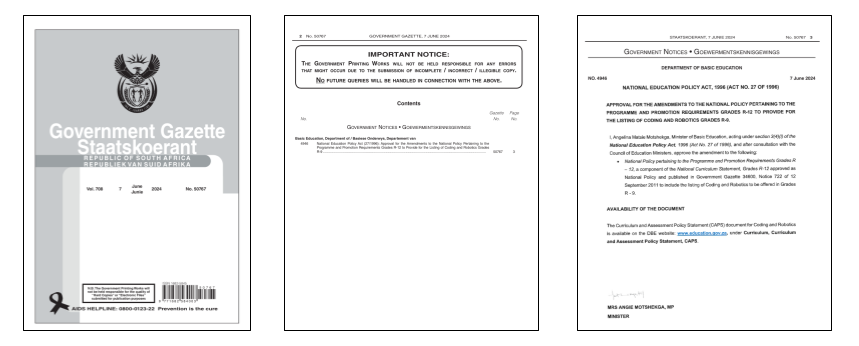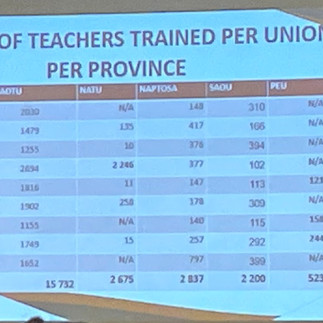Unplugged Coding in South Africa: A Foundation for the Future
- Karen Walstra

- Jun 9, 2024
- 5 min read

Our changing world is digital, coding and computational thinking (CT) aren't just about creating software.
They're foundational skills that empower children to problem-solve, think critically, and innovate.
South Africa is embracing this movement, particularly in the Foundation Phase, where innovative programmes are setting the stage for a tech-savvy generation.
The draft Coding and Robotics curricula (FP, IP and SP) were released in March 2021.

The Government Gazette Vol. 708, 7 June 2024. No. 50767 indicates changes and updates to the draft coding and robotics curriculum, as well as changes to mathematics, natural science and technology, and technology curriculum.
This really makes the change exciting in our country!
We look forward to seeing the curriculum soon!
What is Unplugged Coding?
Unplugged coding teaches the principles of coding without computers or screens.
It involves games, activities, and hands-on exercises that help children grasp concepts like pattern recognition, sequencing, decomposition, abstraction, algorithm design, loops, debugging and problem-solving.
Think of it as building blocks for understanding how to give instructions to computers.
Why Teach CT in the Foundation Phase?
Integrating computational thinking into maths, language, and life skills has profound benefits:
Maths: Coding reinforces concepts like patterns, numbers, spatial reasoning, and logical thinking. Activities like creating algorithms for basic calculations or using block-based coding games make maths engaging.
Language: Coding teaches precise language use, following instructions, and understanding the importance of order. Activities like coding stories or giving detailed directions to classmates strengthen communication skills.
Life Skills: CT builds resilience, collaboration, and creative problem-solving. Children learn to break down complex tasks, iterate on solutions, and work together to achieve goals.
Spotlight on Karen Walstra's Initiative
In 2020 I, Karen Walstra, developed SACE endorsed teacher development courses entitled, “Computational Thinking, more than Just Coding” for the foundation, intermediate and senior phases. The FP teacher development course was presented at NAPTOSA’s Gauteng branch at the end of January 2020.
In 2022, I was invited to present my unplugged coding suggestion for South Africa's Department of Basic Education - Teacher Union Collaboration [TUC] skills for a changing world. This “demystifying coding and robotics” workshop was accepted and rolled out by NAPTOSA and NATU Teacher Unions. It was a train-the-trainer model. I trained NAPTOSA and NATU's lead teachers, who then conducted the training across the country.
This programme, launched in 2022, has had a small impact in introducing teachers across our country to unplugged coding strategies and resources. There were 2892 teachers trained by NAPTOSA and NATU, in 2022. (The numbers for 2023 and 2024 I don’t know.)
The focus is on empowering educators to integrate CT into their existing lessons, fostering a new generation of thinkers.
In 2023 I was asked to relook at the Demystifying Coding and Robotics workshop, and include entrepreneurship, which I did.
I know training has taken place, by both NAPTOSA and NATU, but I don't know the numbers.
To all the trainers who conducted these workshops in their communities, I thank you!
The feedback from my training and the other training has been wonderful.

Advantages of Unplugged Coding in South Africa
Accessibility: Unplugged coding doesn't require expensive technology, making it accessible to schools with limited resources.
Equity: By focusing on the core principles of coding, unplugged activities create a level playing field for all learners.
Engagement: The interactive nature of unplugged coding captivates young learners, making it a fun way to build essential skills.
Preparation for the Future: As South Africa's economy becomes increasingly digital, equipping children with computational thinking skills is an investment in their future success.
The Way Forward
South Africa's commitment to unplugged coding in the Foundation Phase demonstrates its vision for education.
Taking children from concrete to abstract when building skills. Getting them to code on digital platforms as their CT comprehension and reading skills develop.
By nurturing computational thinking from a young age, the country is building a solid foundation for innovation and progress.
Want more information or to get involved?
Teachers: More details about the workshops and resources provided by the Karen Walstra “demystifying coding workshop, contact Karen
Parents: Encourage your child's school to incorporate unplugged coding activities.
Everyone: Spread the word about the importance of computational thinking for South Africa's future!
Let's empower our children to become not just consumers of technology, but creators, innovators, and problem solvers
The two workshops' content topics
2022: Demystifying Coding and Robotics Workshop Agenda

First Session: Overview of demystifying coding and robotics and creating an awareness
Icebreaker: problem solving & collaboration
Why we should do coding and robotics
Developing 21st Century Learning
Creating critical and creative thinkers - all about the questions
4th Industrial Revolution realisation
Second Session: Demystifying coding
Background introduction - what is coding?
Unplugged Computational Thinking skill activities, develop concept knowledge
Unplugged coding tasks and games - hands-on, interactive, problem-solving activities
Awareness of online coding resources (websites and applications)
Third Session: Demystifying Robotics and Coding
Background information
Unplugged “tethered robot” - problem-solving. hands-on, interactive activities
Design Process activities - thinking and doing
Awareness of online robotic resources (websites and applications)
Awareness of actual physical robots
Fourth Session: Round up
Internet safety - quick overview
Tips to Consider Classroom Management & Teaching Strategies - Robotics & Coding
Teaching strategies linked to resources and/or devices
Teaching methodologies linked to critical and creative thinking
Reflection and Self Assessment, Workshop Evaluation, and Closing
References
2023: Creating an Awareness of Coding, Robotics & Entrepreneurship One-Day Workshop Agenda

First Session: Coding, Robotics & Entrepreneurship Overview
Activity 1.1: Icebreaker - Begin the Entrepreneurship Journey
Activity 1.2: Why should learners be introduced to entrepreneurship?
Activity 1.3: Fourth Industrial Revolution - Different Technologies
Activity 1.4: Fourth Industrial Revolution - Jobs around us
Activity 1.5: Steps to your entrepreneurship journey
Activity 1.6: Why should we introduce coding and robotics?
Activity 1.7: Creating critical and creative thinkers - all about the questions
Second Session: Demystifying Coding
Activity 2.1: Background Introduction - what is coding?
Activity 2.2 Unplugged Computational Thinking skill activities, develop concept knowledge
Activity 2.2.1 Problem Identification
Activity 2.2.2 Pattern Recognition
Activity 2.2.3 Decomposition
Activity 2.2.4 Abstraction
Activity 2.2.6: Algorithm design
Activity 2.2.7: Computational Thinking Skills Summary
Activity 2.3: What is coding?
Activity 2.3.1: Exploring Binary Code
Activity 2.3.2: Unplugged Coding Games
Activity 2.3.2.1: Algorithm Design - Simple directional Game
Activity 2.3.2.2 Simple Directional Game - Own game
Activity 2.3.3: Online coding resources (websites and applications)
Activity 2.3.3.1: Coding using Apps
Activity 2.3.3.2: Coding using Websites
Activity 2.3.3.4: Exposure to Coding Apps and Websites
Third Session - Activity 3: Demystifying Robotics & Coding
Activity 3.1 Background to Robotics
Activity 3.2.1 The Engineering Design Process / Technological Process
Activity 3.2.2 Let’s investigate - Wheels & Axles
Activity 3.2.3 Let’s investigate what we could make - Levers
Activity 3.3: Sensors used to make household products
Activity 3.4: Awareness of online robotic resources (websites and applications)
Activity 3.4.1 - PhET Simulation to build an electric circuit
Activity 3.4.2 - Tinkercad: build electric circuits and 3D models
Activity 3.5: Awareness of actual, physical robots
Activity 3.6: Digital Skills and Entrepreneurship
Fourth Session: Activity 4 - Round Up
Activity 4.1 - Internet safety and your digital footprint
Activity 4.2 Tips to Consider Classroom Management & Teaching Strategies - Robotics & Coding
Activity 4.3 Self Assessment, Evaluations and Reflection
References
I look forward to engaging with you about coding and robotics.
Reach out to me, Dr.Karen Walstra.
Details on the contact page.
Other information:
June 2024 Government Gazette about Coding and Robotics https://gpwonline.sharepoint.com/sites/gpw-web/Shared%20Documents/Government/50767%207-6%20BasicEducation.pdf?CT=1717858353164&OR=ItemsView
May 2024 Nelson Mandela University Unplugged coding to be rolled out to Foundation Phase learners across South Africa https://news.mandela.ac.za/News/Unplugged-coding-to-be-rolled-out-to-Foundation-Ph
May 2024 Foundation Phase Subject Advisors are trained on Coding and Robotics CAPS https://www.education.gov.za/ArchivedDocuments/ArchivedArticles/Foundation-Phase-Subject-Advisors-Coding-Robotics-CAPS-0524.aspx
Feb 2021 Some schools to start piloting coding, robotics curriculum https://www.sanews.gov.za/south-africa/some-schools-start-piloting-coding-robotics-curriculum
March 2021 CALL FOR COMMENTS TO AMEND THE CURRICULUM AND ASSESSMENT POLICY STATEMENT (CAPS) TO MAKE PROVISION FOR CODING AND ROBOTICS GRADES R- 9 https://www.education.gov.za/DraftCapsCodingRobotics.aspx


















































Comments